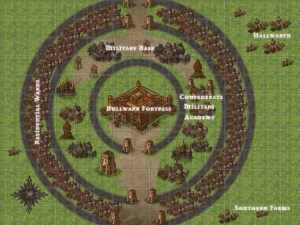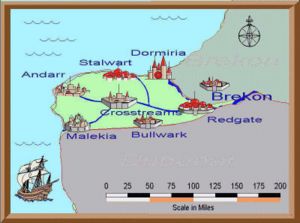Bullwark: Difference between revisions
| Line 24: | Line 24: | ||
==History== | ==History== | ||
===Early | ===Early Settlement=== | ||
Prior to the early 4th century A.O.D, the area of present-day Bullwark was contested between the armies of [[Kurathene|The Kurathene Empire]] and its southern neighbor, the nation of [[Dubunat]]. Initially, Bullwark was set up as a small fortress to guard against the onslaught of [[Orc|orcs]] that came into the region during the [[The Great War|Great War]] and afterward, but it was not until the year 317 A.O.D. that the emperor chartered one of his nobles, Duke Maron Clairvont of [[Julaspium]], to settle the fortress and expand it. Both the emperor and Lord Clairvont understood that this would be a resource-intensive job, since the fortress had no access to the waterways to the north and would need to receive all of its supplies over land. However, both men thought it was worth the effort in order to shield the area from further invasion. | Prior to the early 4th century A.O.D, the area of present-day Bullwark was contested between the armies of [[Kurathene|The Kurathene Empire]] and its southern neighbor, the nation of [[Dubunat]]. Initially, Bullwark was set up as a small fortress to guard against the onslaught of [[Orc|orcs]] that came into the region during the [[The Great War|Great War]] and afterward, but it was not until the year 317 A.O.D. that the emperor chartered one of his nobles, Duke Maron Clairvont of [[Julaspium]], to settle the fortress and expand it. Both the emperor and Lord Clairvont understood that this would be a resource-intensive job, since the fortress had no access to the waterways to the north and would need to receive all of its supplies over land. However, both men thought it was worth the effort in order to shield the area from further invasion. | ||
The high-resource nature of the settlement kept it small and functional for several centuries. Other nobles surrounding the area had settlements of their own that would later turn into the other major cities to form the confederation now known as [[The Seven Cities|The Seven Cities Confederation]]. For mutual safety, they donated personnel and supplies to keep the fortress running. | |||
Bullwark makes only what it needs in terms of goods and services, and it exports little. Much of its wealth, whatever meager wealth it contains, is imported from elsewhere, usually the other six cities. The center of the city is a vast fortress run by a series of generals who double as the nobles of the city. These nobles are not just responsible for military matters, but also for making laws and running the day to day operations of the city. For the most part, this task is not difficult for them internally, because most citizens of Bullwark understand the nature of the law and follow it accordingly. Those who don't are either expelled or imprisoned. | Bullwark makes only what it needs in terms of goods and services, and it exports little. Much of its wealth, whatever meager wealth it contains, is imported from elsewhere, usually the other six cities. The center of the city is a vast fortress run by a series of generals who double as the nobles of the city. These nobles are not just responsible for military matters, but also for making laws and running the day to day operations of the city. For the most part, this task is not difficult for them internally, because most citizens of Bullwark understand the nature of the law and follow it accordingly. Those who don't are either expelled or imprisoned. | ||
Revision as of 00:23, 15 April 2017
| Bullwark | |
| Other Names: | Shield of The North |
| Society: | |
| Nation/Territorial Area: | The Seven Cities |
| Population: | 440,000 |
| Languages: | Common, Orcish, Romini |
| Deities Worshipped: | The Nine, and other minor deities |
| General Alignment: | Lawful Neutral (Good) |
| Head of City Government: | High Commander Bernolf Rook |
| Races: | |
| 30% Human, 30% Orc, 20% Dwarf, 20% Other | |


The city of Bullwark is the southernmost city of the confederation known as The Seven Cities. It is the only city in the confederation that does not have access to a major watery thoroughfare, yet it is highly regarded as the glue that holds the confederation together.
Bullwark is the smallest and youngest of the Seven Cities, yet its troops make up the largest percentage of the Confederated Army. This is because all males of fighting age that are residents of the city are required by law to serve in the military. This is at times hard to enforce because record-keeping can be difficult unless magic is employed to help, but luckily for Bullwark, strict measures for enforcement are not necessary. The citizens of Bullwark are incredibly nationalistic and proud of the Confederation. They take great pride in being allowed to serve in its armed forces, and it is thought that this pride partly rubs off on the other cities to solidify their confederation.
History
Early Settlement
Prior to the early 4th century A.O.D, the area of present-day Bullwark was contested between the armies of The Kurathene Empire and its southern neighbor, the nation of Dubunat. Initially, Bullwark was set up as a small fortress to guard against the onslaught of orcs that came into the region during the Great War and afterward, but it was not until the year 317 A.O.D. that the emperor chartered one of his nobles, Duke Maron Clairvont of Julaspium, to settle the fortress and expand it. Both the emperor and Lord Clairvont understood that this would be a resource-intensive job, since the fortress had no access to the waterways to the north and would need to receive all of its supplies over land. However, both men thought it was worth the effort in order to shield the area from further invasion.
The high-resource nature of the settlement kept it small and functional for several centuries. Other nobles surrounding the area had settlements of their own that would later turn into the other major cities to form the confederation now known as The Seven Cities Confederation. For mutual safety, they donated personnel and supplies to keep the fortress running.
Bullwark makes only what it needs in terms of goods and services, and it exports little. Much of its wealth, whatever meager wealth it contains, is imported from elsewhere, usually the other six cities. The center of the city is a vast fortress run by a series of generals who double as the nobles of the city. These nobles are not just responsible for military matters, but also for making laws and running the day to day operations of the city. For the most part, this task is not difficult for them internally, because most citizens of Bullwark understand the nature of the law and follow it accordingly. Those who don't are either expelled or imprisoned.
Off to the northern side of the city is a vast training ground and military base that is used to train the Confederated Army. Soldiers from all Seven Cities come there to train and learn the ways of combat. The fortress and the base together are considered the military center of the confederation. To the east of this complex is the Confederated School of War, where officers are trained for the Confederated Army. This school is not directly controlled by the government, however, and is often known to take students from any place in the world who can afford the fees. Many Kurathene Nobles have sent their sons there, as have M'Chekian nobles, and even some sons of Toran Shaarda.
Surrounding these areas are the residences, usually made up of functional homes with little austerity. There are a decent number of inns and other establishments but rarely does one find the shady places that are so common in the other cities. The residents of the city are much like the noble. They tend towards kindness and the desire to help others, with a healthy respect for the law.
Racially, Bullwark is fairly diverse. Initially, the city was largely human, but over the centuries many orcs have made their homes there from either Dubunat or Brekon. There are even a fair number of dwarves and halflings in the city that contribute immensely to the local culture. Less common races would include elves and goblinoid, but there are plenty of token examples, as always.
Religion is not such a prevalent force in Bullwark as is nationalism, but there are sizeable temples in the city to Dra'Nar, Dre'Ana,Gorethar, Toran, and Senath. Smaller shrines to other deities are also fairly common.